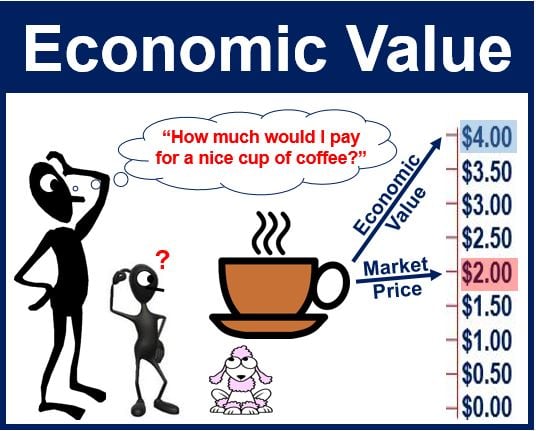Economic value is a calculation of the profits an asset has either produced or may produce in the future. It is a measure of the benefit a product or service provides an economic agent (person or company).
Economic value therefore refers to the highest amount a consumer is willing to pay for a product or service in a free market economy, or in a socialist economy how long a person is willing to wait in order to get a government-provided good or service.
It is not the same as market price, which is the minimum price a good can be offered at in the marketplace. Economic value is typically higher than the market price.
 Economic value is the most a consumer is willing to pay for a good or service.
Economic value is the most a consumer is willing to pay for a good or service.
When consumers buy a marketed product, they make a comparison between the amount they would be willing to pay for it with its market price.
We are generally only willing to buy something if its price is the same as or more than the market price.
Economic value is one of several ways we can define and gauge value. Economic values are useful to take into account when making economic choices – options that involve tradeoffs in allocating resources.
How much is the consumer willing to give up?
Economic value can be measured by the maximum amount of other things an individual is willing to give up in order to get something.
Imagine somebody has to choose between buying milk or pasta, and all that exists are those two products, money does not exist. The value of a pint of milk would be measured by the most pasta he or she is willing to give up in order to have one more pint of milk.
In a market economy, legal tender – dollars, pounds, euros, yen, etc. – is universally accepted as a measure of economic value. The maximum amount of a currency that a person is willing to pay tells us something about what other goods and services he or she is willing to give up in order to purchase that item – this is known as people’s ‘willingness to pay’.
Economic value and the net economic benefit
Two products that sell for the same price might not have the same net benefits. For example, imagine I have the choice between buying a dozen regular eggs or organic free-range eggs, which both sell for $3.
I prefer organic eggs and am willing to pay up to $4 for them, but would only ever consider going up to $3.50 for the regular ones.
The net economic benefit for the organic eggs is $1, and only $0.50 for the regular ones. The organic eggs have a higher economic value.
Video – The source of economic value
In this TEDxTalk lecture, Dr. Bill Silver, Dean of the School of Business and Economics at Sonoma State University, explores the source of economic value by using one past and one present experience. He compares his father’s pharmacy’s soda fountain with the experience of making a ‘Starbucks run’.
